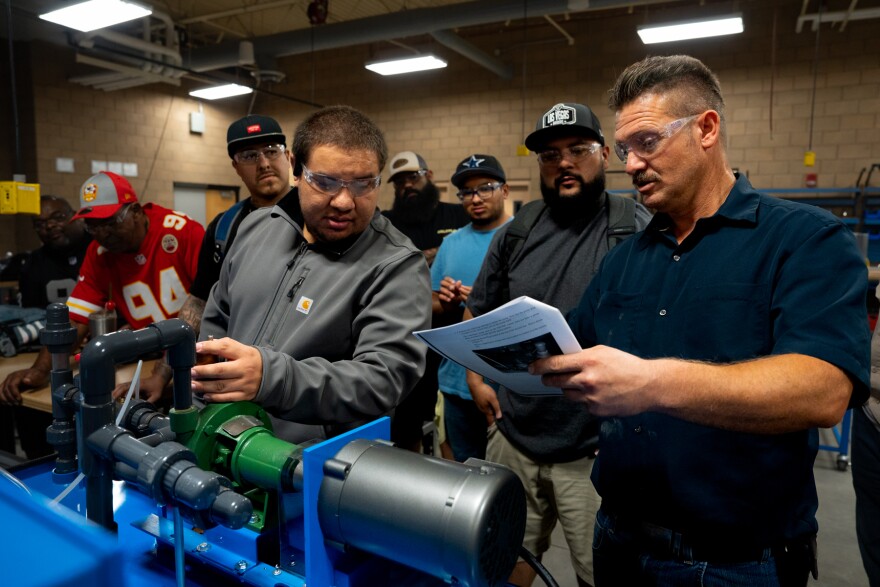The realization of Lithium Valley would put Imperial County on the map as a leader in green energy production — once the companies extracting the highly valuable metal from deep under the Salton Sea are up and running.
But the dream of local communities reaping any benefits from lithium profits could end before it begins.
In November, voters statewide face a ballot measure that would repeal the lithium extraction tax — along with many others statewide — ending a cash flow that now promises to pour millions of dollars into the long-disadvantaged communities around the Salton Sea, which tops deep stores of lithium-laced brine companies are racing to extract.
Their success could mean hundreds of billions of dollars in profits from the metal which is crucial in battery production and therefore essential for moving away from fossil fuels.
An existing tax, passed at the state level, requires companies to pay fees per metric ton of lithium they extract. No fees have been collected yet because companies haven’t yet started extracting lithium to sell.
If the tax is repealed, the community leaders who fought for the lithium tax say they would be forced to start from scratch in their efforts to ensure local communities benefit, embarking on another challenging and costly campaign to educate voters about the benefits of taxing the industry.
That could be an even steeper climb if the ballot measure passes because it also would make passing state and local taxes harder. The measure is now being widely debated throughout California with opponents — including Gov. Gavin Newsom — arguing it is a fundamental threat to the state’s tax code and proponents denying those claims. One analysis says, in the next decade alone, the proposal would toss more than $20 billion in local government fees and revenue into “legal peril.”
Community advocates fear that they face an uphill battle against wealthy companies, and that the measure sets back years of work.
“It wipes out basically all the community benefits we think we deserve,” said Eric Reyes from Los Amigos de la Comunidad.

A cut of the profit
It took years of talks among advocates, leaders and stakeholders to convince state legislators to approve the lithium tax, and it wasn’t a straightforward win. Critics, including those from the lithium sector, said it would hamper the growth of a thriving lithium industry.
But advocates came to the planning table with a message: For years green energy ventures have come through Imperial Valley promising returns to the community, but none have given back in a substantial way.
They argued that if private companies were going to take Imperial Valley resources, they would need to address the fact that the county has the highest unemployment rates in the state, as well as health issues stemming from exposure to toxic sediment from the Salton Sea.
With eyes across the state looking to Lithium Valley as a crucial piece of the puzzle to meeting climate goals, this time advocates’ voices were heard.
According to Imperial County Supervisor Ryan Kelley, companies eventually came around.
“Even industry understood the need and necessity for it,” Kelley said.
Though adopted as a statewide tax, the lithium extraction tax would funnel money into Imperial County, where all of the lithium production currently is in development. Twenty percent would go toward restoration projects on the Salton Sea along which the lithium facilities are being built. The rest would go to the county, which would distribute money to frontline communities impacted by the industry.
Kelley said the tax strikes the necessary balance of providing for community needs and allowing the lithium companies to establish prosperous businesses.
At first Kelley had imagined creating a local tax, but state legislators pushed it through on the state level. He says that if the tax is upended, local leaders would rally to educate voters on how the tax revenues would be used and why it’s important.
“If that were to occur, we would take it to a local vote and bring it before our community,” Kelley said.
For a statewide tax, like the lithium tax, the measure would require not only a two-thirds vote by Legislature but a majority popular vote as well. But supporters say that if the tax doesn’t hold up on the state level, they will focus on getting it approved locally.
In either case, Reyes, from Amigos de la Comunidad, said that it would mean a lot of work wiped away and that organizers would have to mobilize.
“We'd have to have a really rigorous, robust campaign to have enough people understand how this is a tax that was passed, then repealed by this new ballot initiative.”

Behind the multimillion-dollar measure
Deep-pocketed special interests are driving the ballot measure.
The Taxpayer Protection Government Accountability Act, as it's called, was sponsored by the California Business Roundtable, an organization financed by investment firms with international holdings. The group, whose political action committee has spent nearly $60 million since 2020 opposing tax measures, says the act would put a check on taxes that make California unaffordable.
As the ballot measure’s opponents have pointed out, the group’s top contributors include multibillion-dollar firms with interests in cutting taxes for their own benefit. Blackstone Property Partners (the real estate arm of the international investment firm), Kilroy Realty and Douglas Emmett Properties are among the Business Roundtable’s top contributors.
According to some estimates, billions of tax dollars across the state are on the line with the November measure. If it passes, San Diego County communities could lose a cannabis business tax projected to bring in more than $5 million in annual revenue, along with other taxes and fees, including a hotel tax in Imperial Beach.
What would it do? It proposes the following changes to state law governing tax and fee increases and would apply, retroactively, for any tax or fee passed after Jan. 1, 2022:
State tax increases: Current law requires a two-thirds vote by the California State Legislature. The measure would also require voters statewide to approve the tax by a majority vote.
State fee increases: Current law enables the administration to approve increases. The measure would require a two-thirds vote by the Legislature and approval from a majority of voters statewide.
Local special tax increases: Current law requires a majority vote among local voters. The measure would increase the threshold for approval to two-thirds.
Local fee increases: Current law allows local governments to approve increases. The measure would require approval by the majority of local voters.
Read the ballot language here.
Lawmakers are not taking that lightly. Opinions are strong and mounting.
Democratic Gov. Newsom has called on the state Supreme Court to consider removing the measure from the ballot, saying that it would impede the government from fulfilling its basic functions.
In the last weeks, high profile politicians such as former Gov. Jerry Brown, also a Democrat, have joined Newsom’s call. Meanwhile, Assembly Republican Leader James Gallagher came out in its defense.
Referring to Newsom’s challenge, Gallagher told inewsource that “the right of the people to the initiative should not be infringed by shenanigans. And that's exactly what's happening right now.”
State Senator Steve Padilla, a San Diego Democrat who is currently ushering new legislation through Sacramento meant to give tax credits to lithium-related businesses in order to promote job growth in “Lithium Valley”, said the ballot measure is being pushed by “extremists with the intent of dismantling the smart fiscal policy California has spent decades building that has made this state one of the largest economies in the world.
“This proposal poses a real threat to local and state government projects and I am glad the Supreme Court is looking into the legality of the measure,” he said.
Last year the Imperial County Board of Supervisors sent Padilla a letter opposing the measure. San Diego City Council unanimously passed a resolution against it as well. The Council is now among many entities in opposition, including the cities of San Francisco and Los Angeles, the Association of California Water Agencies and the League of California Cities which has been campaigning throughout the state on what they consider to be the dangers of the act.
Ben Triffo, a lobbyist with the League of California Cities, said that proponents of the bill are misleading voters about who it serves.
“This measure really just gives carve outs to some of those corporations that are part of the Business Roundtable and prevents them from paying their fair share,” Triffo said.
Triffo is referring to the kinds of taxes that would face challenges if the measure passes, one prominent example being a property transfer tax in Los Angeles that could gather over a billion dollars of annual revenue by taxing the sale of properties based on a percentage of their value. Real estate companies are the prime donors to the California Business Roundtable.
The challenge to the lithium tax is another example of how multinational corporations could benefit from the ballot initiative.
Reyes said that the lithium tax was a momentous achievement. Arriving at an agreement among stakeholders, local leaders, legislators, labor unions and environmental justice organizations had set a new tone in an already impacted community.
He also said that it takes a lot of resources to run the education campaigns to get voters to understand what’s at stake and to come out and vote. He says the community is already strained as it is.
“We understand that the underserved communities will be the ones most impacted,” he said. “And now we’re gonna be even more underserved.”








